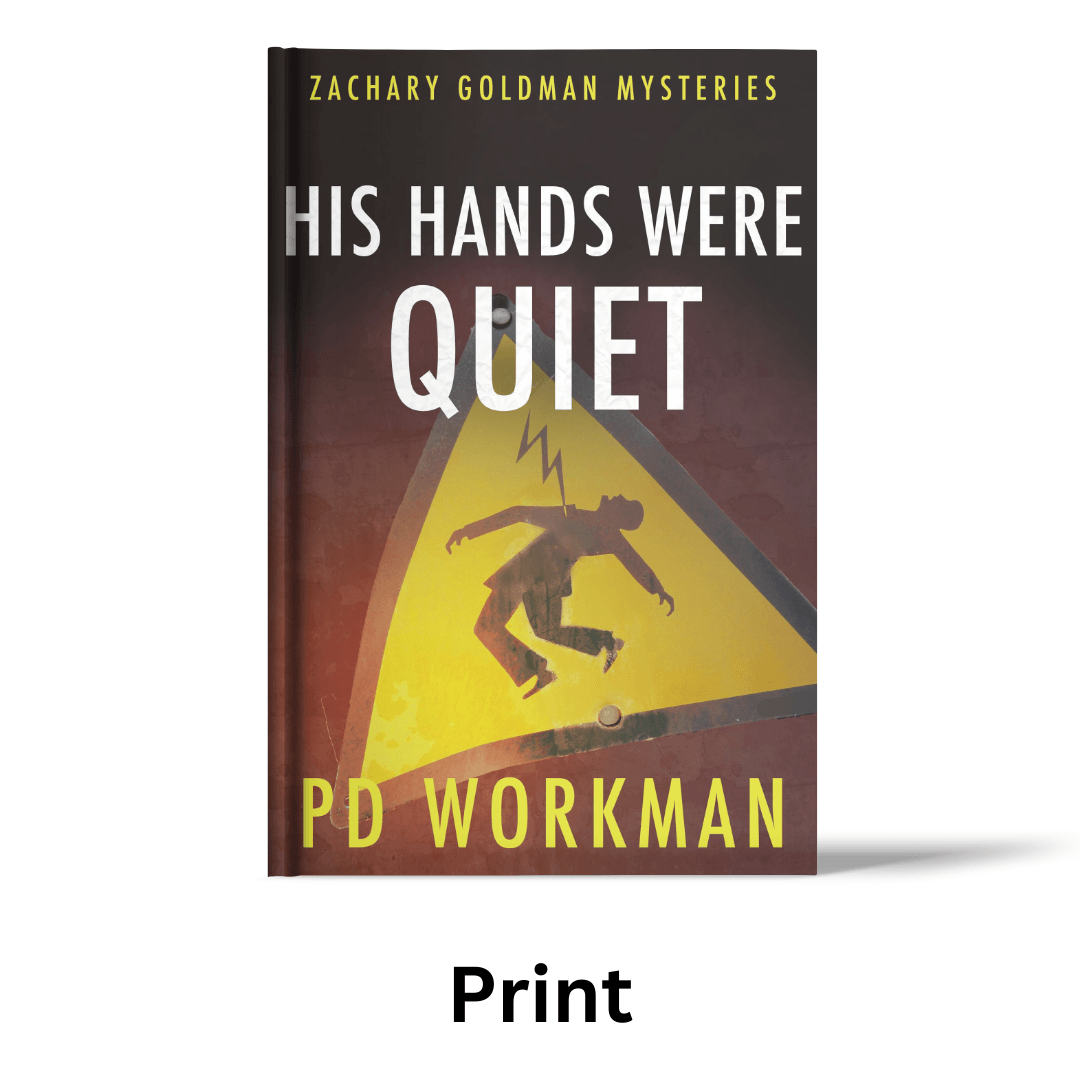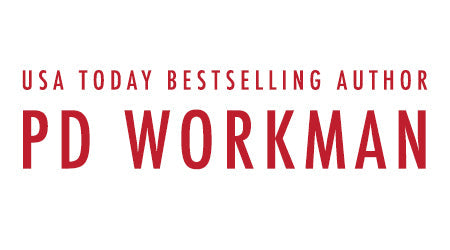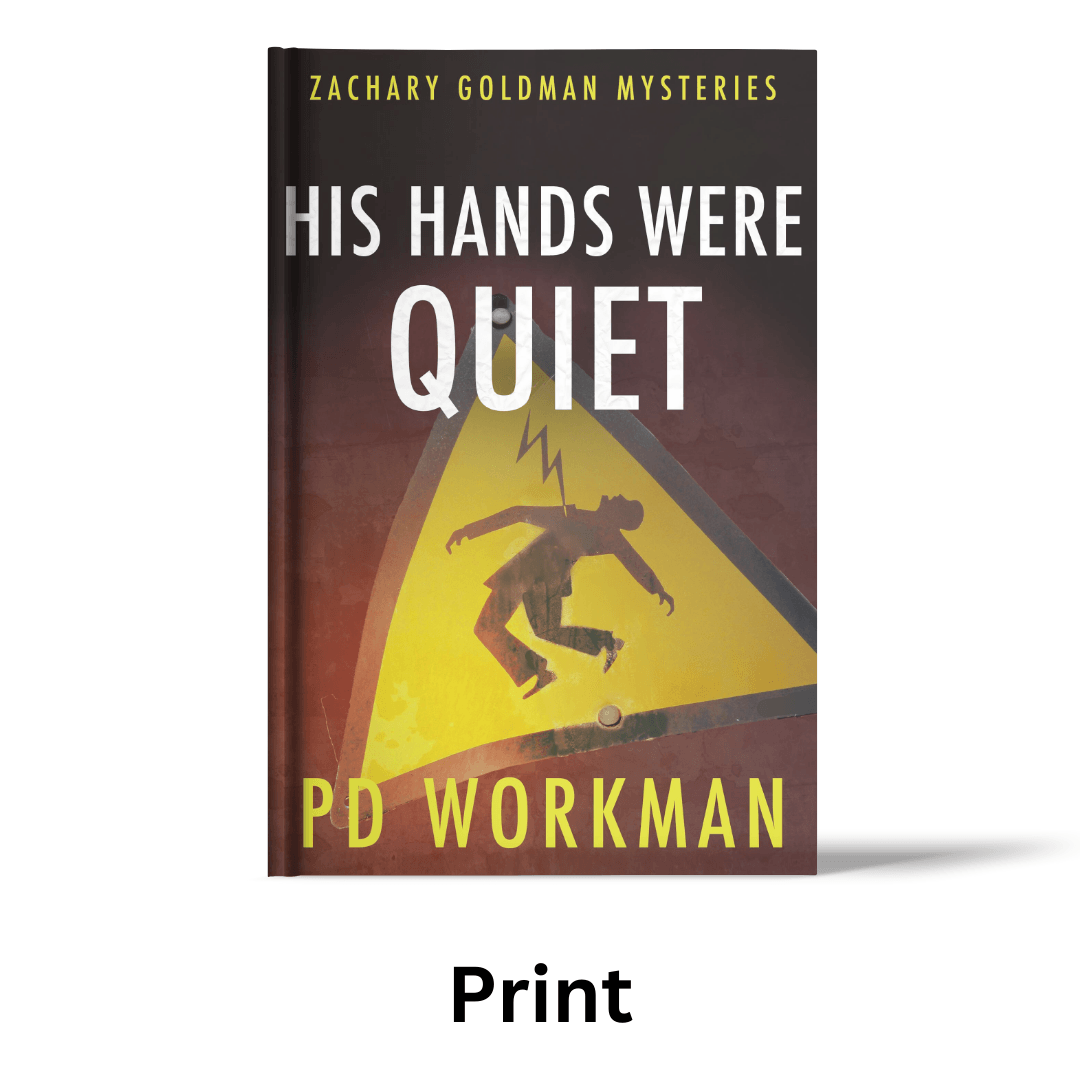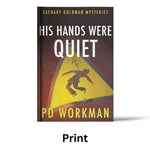His Hands Were Quiet - ZG 2 paperback
His Hands Were Quiet - ZG 2 paperback
Couldn't load pickup availability
He’s better off dead anyway.
Hired to investigate the death of an autistic boy in a treatment facility, PI Zachary Goldman is concerned about the therapies he sees there. While he is assured that the children there are not actually being hurt, his investigation leads to the discovery of even deeper institutional abuses.
Battling the ghosts of his own past, Zachary fights to uncover the facility’s dark secrets and to get as many children as he can out of harm’s way.
⭐️⭐️⭐️⭐️⭐️ The way that PD Workman showed the autistic perspective in contrast to the mainstream views about us was lovely. I appreciated it more than I can express in words. She did thorough research on multiple sides of the issue and it shows. She gives multiple autistic perspectives, not just one, and the way they were presented brought me to tears multiple times … The story itself was a solid mystery with many exciting twists and turns along the way. Even if I wasn’t personally invested in the topic (being autistic myself and having autistic children), I still would’ve enjoyed it as a mystery. I’m extremely likely to pick up more of her books now that I’ve read this one!
Zachary Goldman, Private Investigator, is flawed with a capital F. Shattered by the tragedies of his own life, he will somehow still manage to pick himself up and dig just a little bit deeper than anyone else to find the vital clues.
Maybe being broken makes it easier for others who have faced tragedy to trust him. Walk with Zachary as he solves cases that will stretch his abilities to the limit.
Even with his own life in shambles, Zachary Goldman is still the one you want on the case.
Investigate this P.I. mystery now!
Shipping & Returns
Shipping & Returns
All sales are final.
If you have accidentally purchased the same ebook twice, please contact me and we will work it out with a refund or store credit.
Physical products which have not yet been fulfilled can be cancelled, but once they have been shipped to you, they may not be returned.
Share

Collapsible content
Click to Read Sample
CHAPTER 1
Mira Kelly put the pictures of her son down on her kitchen table, one at a time, like they were precious treasures she thought Zachary might try to run off with.
Photographs were Zachary’s passion. Ever since Mr. Peterson, his foster father at the time, had given him a used camera for his eleventh birthday, he’d been taking pictures. It was that passion that had eventually led him to his profession. Not a department store photographer or a wedding photographer, but a private investigator. It gave him the flexibility to set his own hours, even if many of them were spent sitting in a car or standing casually around, waiting for the opportunity to catch a cheating spouse or insurance claim scammer in the act.
Zachary ignored the lighting and framing issues in Mira’s pictures and just looked at the boy’s face. He was a teenager, maybe thirteen or fourteen. Still baby-faced, with no sign of facial hair. Dark hair and pale skin, like Zachary’s. Quentin’s hair was a little too long, getting into his eyes in uneven points. Zachary couldn’t stand hair getting in his face and ears and kept his short. Not buzzed like foster parents and institutions had always preferred, but still easy to care for. The first few pictures of Quentin didn’t give a clear view of his eyes. His eyes were closed, hidden by his shaggy hair, or his face was turned away from the camera. Then Mira put one down on the table that had caught his eyes full-on, looking straight through the camera. Blue-gray. Clear. Distant.
Mira kept her fingers on the photo, reluctant to release it to him. “Quentin was a beautiful baby,” she said. “Everyone always said how beautiful he was. Not cute or handsome, beautiful. He could have been a model. But he didn’t smile and laugh when you smiled or tickled him, like other babies. He laughed at other things; the sunlight filtering through the leaves of a tree, music… I didn’t realize, in the beginning…” She wiped at the corner of her eye. She’d been resisting tears since she had first greeted Zachary.
Isabella Hildebrandt had said that Quentin had been autistic when she asked Zachary if he would meet with Mira. The boy had been living at the Summit Living Center, some sort of care facility, when he had died suddenly. ‘Died suddenly’ was a euphemism that Zachary particularly hated.
Mira was convinced that Quentin’s death couldn’t have been suicide. “He wouldn’t have done that,” she insisted again, looking at the picture that showed Quentin’s eyes.
“Why not?” Zachary asked baldly.
He could see that his bluntness surprised her. She was used to people talking about her son’s death in veiled terms. Coming at it sideways and trying to comfort her. But that wasn’t Zachary’s job. Zachary’s job, if he took the case, would be to find out the truth about Quentin’s death. And if he was going to do that, he needed Mira to speak plainly instead of soft-pedaling euphemisms.
“He… he couldn’t.” She stumbled over the words, looking for a way to explain it. “That just… wasn’t something that he would have been capable of.”
“Physically, you mean?”
“No, he was healthy physically, mostly, but… he had autism. He didn’t have the ability… mentally… to decide to do something like that, and plan it out, and follow through.” She shook her head. “The idea is ridiculous.”
“Because he was mentally handicapped.”
“No… not handicapped. I just don’t think… I don’t think he could have understood what it meant, to kill himself. And I don’t think he could have planned it out. There is other stuff that can go along with autism… His executive planning skills…”
Zachary wasn’t sure what that meant. He looked at the other angles of the case. “Was he depressed?”
“He was happy at Summit. It was a good place for him. The only place that had been able to manage his behavioral issues.”
Zachary looked at the haunting eyes that looked up from the photograph. “This is a recent photo?”
“Yes.” Mira looked down at him. “I know he’s not smiling for the picture. But he never smiled for pictures. He was happy at Summit. They were able to get him off of all of the meds that the other places had put him on. So that he could be himself and not a drugged-out zombie.”
“Sometimes depression isn’t obvious. People are often taken by surprise by suicides.” Zachary looked away from her uncomfortably. Other times, depression was obvious, and friends or family members did everything they could to head it off. Like with Isabella Hildebrandt, when her mother had hired Zachary to look into her son Declan’s untimely death, hoping to bring Isabella some peace. They’d been unable to prevent her suicide attempt. Only luck and quick-acting professionals had been able to bring her back. As they had done for Zachary in the past. “When you say they took him off of his meds… did that include antidepressants?”
“No, he was never on antidepressants. He was on other medications to keep him quiet. I couldn’t have him at home anymore, because he was too much of a danger to my younger sons. And me.”
There was a snapshot on the fridge of Mira with two younger boys, maybe eight and ten. Mira was a slight, small woman. The ten-year-old was almost her height. There were no pictures of her with Quentin, but Zachary suspected he was taller than she was by a few inches. Even though Quentin had a slim build, a child in the midst of a meltdown could be very strong. Looking down at the pictures of Quentin on the table, Zachary saw another child in his mind’s eye.
Annie Sellers had also been autistic, and well-known for her rages. He had watched, through the narrow observation window of his detention cell, as several members of the Bonnie Brown security staff had tried to bring her under control. She was slim and small, but even three guards together could barely hold on to her to get her into a cell.
Zachary blinked, trying to focus on the case at hand. Annie was in the distant past. He couldn’t do anything for her. No one could.
“How long had Quentin been at Summit?”
“Two years. They turned him around completely. He was not the same child.”
“And you hadn’t noticed any changes in behavior recently. Anything at all.”
Mira bit her lip. She was a strawberry-blonde with a pixie cut. She kind of reminded Zachary of a forty-year-old Julie Andrews. The same shape to her face. But there were fine lines that told the tale of a hard life. There was no sign of a man in the house. Raising three boys as a single mother was not an easy job, especially when one of them had behavioral issues. Summit was a good two hours’ drive from Mira’s house, which meant that she wasn’t visiting him daily.
“He’d been agitated the last few times I went to see him,” Mira said finally. “They said it was probably just hormones, and they were increasing his therapy sessions to address it.”
Zachary scratched a note to himself in his notepad. “What do you mean by agitated?”
“More… anxious… more… behaviors…”
“Describe to me what that looked like. What exactly was he doing?”
“Picking at his skin… flapping… He was voicing and didn’t want to sit down to visit with me. He wanted to walk around to visit, but they said… his therapist said he needed to work on sitting quietly to visit. When they forced him to sit down, he started banging his head or got angry, and they had to take him out and cut our visit short.”
Zachary wrote down each of the behaviors. “He didn’t usually do those things?”
“No, he’d been pretty good at Summit, they could usually suppress them.”
“Is there something that triggers them? When he lived at home, did he do them all the time, or just sometimes?”
Mira ran her fingers through her hair. There were bags under her eyes, camouflaged with makeup. She looked exhausted. She probably wasn’t sleeping.
“Yes, when he was frustrated about something… Before he died, I felt like he wanted to tell me something. But it’s difficult for him. If I’d been able to walk around with him, talk with him some more, I might have been able to figure out what it was. But they said he had to go back to his room.”
“So he could talk…?”
“He was mostly nonverbal. He had a few words. He would take my hand to show me something or ask me to do something for him. But Summit said I needed to force him to use speech.” Mira sighed heavily. “They said that if I ignored his nonverbal communication… he would use words more…”
“Oh.” Zachary nodded. “Then he could, if he had to?”
Mira frowned and tugged at a lock of hair. “Well… it was hard for him. They said that if he could speak some of the time, then he could speak all of the time, if he just worked at it. When he was at home, we would use pictures, gestures, whatever we could.” She wrapped the lock around her finger. “It wasn’t like he was just being willful or lazy when he wouldn’t speak. That’s what Dr. Abato says, but I always thought… Quentin was doing the best he could, and that we should let him use PECS or signs or whatever he needed to communicate…”
“That makes sense,” Zachary agreed, giving her a nod of encouragement.
“They said that I was just babying him. Keeping him from progressing. They said if he was ever going to get out of Summit, maybe on a work program or something, he would have to be able to speak. To get along in the real world and be treated like everyone else, he needed to be able to speak.”
“And it was working? You said that his behavior had improved at Summit. Did that include his speech?”
Mira picked up one of the photos from the table and stared at it, her eyes shiny with tears.
“Scripted speech,” she offered finally. “They were very proud of how well he was doing with scripted speech.”
“What’s that?”
“I would come to visit him, and he would say, ‘Hi, Mom.’ And I would say hi to him. He would ask me how I was doing, and I would tell him and ask him how he was. He would say, ‘fine’ or ‘happy’ or ‘well.’ But that was it… if I asked him what he had been doing, or who his friends were, or anything like that, he would fall apart. He would cry and mope and shake his head at everything I said. Then when it was time go, and I would say goodbye and hug him, he would pick up the script again. He’d say, ‘Bye, Mom. Love you. See you next time.’ They’d taught him how to say hello and goodbye…” Mira’s voice cracked. “But they had just trained him to say the words. He still couldn’t have a conversation. He still didn’t have a script for what came between hello and goodbye.”
“Maybe that would have come.”
“Maybe… but conversations are complicated. I don’t know how many different scripts he could have learned. There are so many different pathways a conversation could have followed.”
Zachary looked at the yellow envelope at Mira’s elbow that she had not yet opened. She was assiduously ignoring it.
“Do you want to take a break?”
Mira looked relieved. She let out her breath. “Yes. How about some tea? Can I get you a drink?”
“Tea would be great,” Zachary agreed. He was not a tea drinker, but it was a soothing ritual for those who were. It would help Mira to calm down and move forward again.
She got up from the table and moved around the kitchen, putting the kettle on and rattling the cups and saucers and other bits. She opened the kitchen window a crack, letting in a breath of fresh, cool air.
“How long have you known Isabella?” Zachary asked her.
Isabella, The Happy Artist, beloved local TV personality, had connected the two of them. Zachary had been the one to investigate her son Declan’s death and, in spite of the hell she’d been through as a result, she seemed to be grateful to Zachary.
“I’ve known Isabella a long time. Since we were both in school. We weren’t really close friends. But I watched her when she started painting on TV. Quentin loved to watch her show. I knew Isabella had used a private investigator, so I called her…”
Zachary nodded.
Mira set their cups on the table and filled them. Zachary stirred his, not really interested in drinking it.
“I can look at those when I get home,” he said, nodding to the unopened envelope. “There’s no reason you have to look at them again.”
Mira hesitated, considering his offer, then shook her head. “No. I can do this.”
She took a couple of determined gulps of piping hot tea and picked it up.
Award-winning Canadian author P.D. Workman has written over a hundred addictive page-turners featuring diverse and divergent sleuths, high-stakes investigations, and stories that linger long after the last page.
Her books dive deep into characters’ minds while exploring timely social issues through fast-paced, emotionally charged plots. Readers praise her work for its powerful emotional truth combined with unputdownable suspense.



